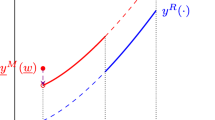Abstract.
When agents have quasi-linear preferences, every incentive compatible social choice function can be implemented by a simple extensive form mechanism, even if agents are allowed to use mixed strategies. The second stage of the mechanism, which is used to elicit the agents' true preferences, is not reached in equilibrium; it gives agents strict dominant strategies, so equilibrium outcomes are not sensitive to agents' beliefs off the equilibrium path. This solves the multiple equilibrium problem of a principal facing several agents: the mechanism implements any solution to the principal's second best maximization problem. The specification of incentive compatibility constraints in the principal's problem presupposes a precise knowledge of the agents' beliefs. However, the above mechanism can be modified to implement the principal's second best (to within arbitrarily small perturbations of transfers), regardless of the agents' conditional beliefs.
Similar content being viewed by others
Author information
Authors and Affiliations
Additional information
Received: 30 April 1997 / Accepted: 16 September 1997
Rights and permissions
About this article
Cite this article
Duggan, J. An extensive form solution to the adverse selection problem in principal/multi-agent environments . Rev Econ Design 3, 167–191 (1998). https://doi.org/10.1007/s100580050012
Issue Date:
DOI: https://doi.org/10.1007/s100580050012




